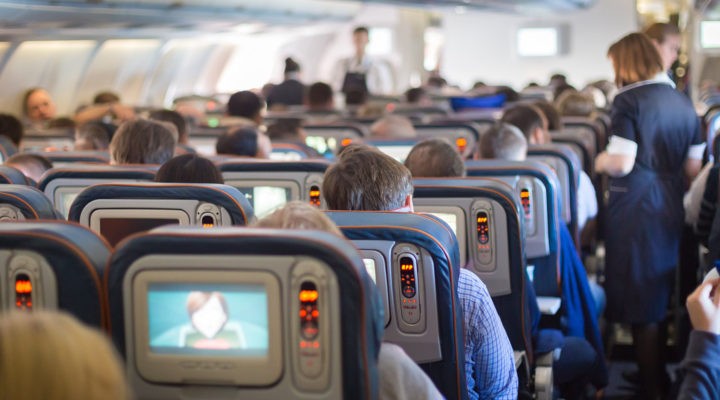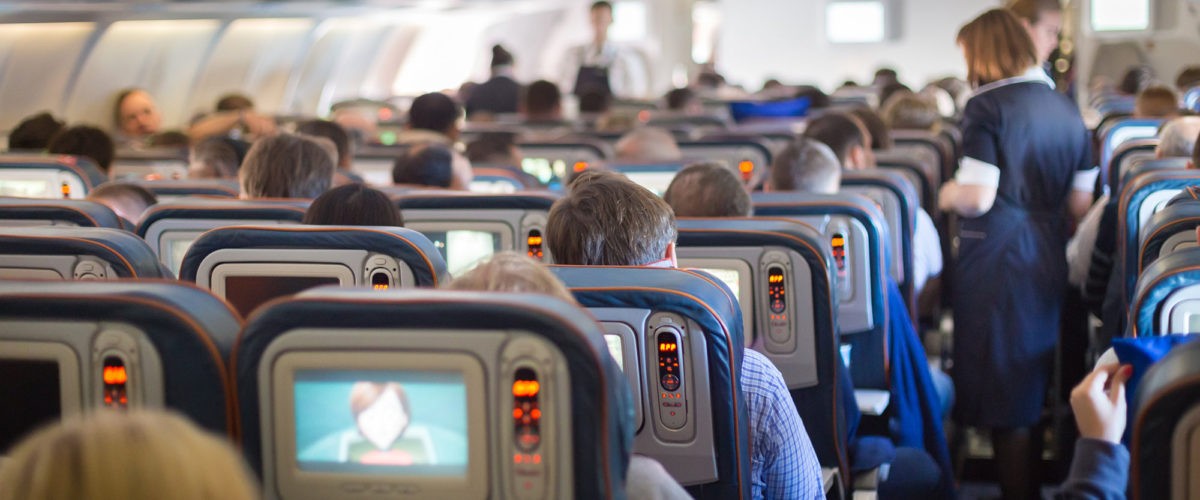I recently got on an airplane for a trip to preach at a Baptist Women in Ministry partner church despite some hesitations I had about flying. My hesitations were because of health concerns related to the current Delta variant spike, but also because of the regular reports of more hostility on airplanes. As a matter of fact, just a few days before this trip, I saw a report on one of the morning news shows about the dramatic increase in incidents of aggression on airplanes in the past year.
My flight home from this trip was on a large plane, and I was seated in the exit row in the middle of the plane just behind a restroom. It was a full flight, but the seat next to me was empty until just minutes before the plane door was scheduled to close. At the last minute, a flustered woman appeared and made her way down the long gauntlet between the seats before wearily dropping into the aisle seat next to me.

Meredith Stone
She and I spent 10 to 15 minutes visiting about the harrowing difficulties she had experienced that day in getting to the airport, problems she had the day before on her trip there, and how even though this flight was later than her original one she was hopeful she might still catch her connection home. Then we each turned to our devices — downloaded TV shows, games and audiobooks.
But around midway through the flight, something happened that bonded us together in a way I rarely have experienced.
I noticed as a woman from a few rows behind us made her way to the restroom. She had caught my attention because I was about to get up to use the restroom myself. For that reason, I realized she stayed in the tiny compartment for a bit longer than usual.
When she emerged, she began slowly walking back toward her seat. But as she did, she stealthily slipped a phone onto the tray table of my seatmate who quickly turned around and said, “This isn’t my phone.”
A weird feeling arose in my gut when I saw that the phone interface was open and words were on the screen. I placed my hand on my seatmate’s arm and said, “Let’s read what it says.”
The woman had left the phone’s Notes app open, and the note contained several sentences. Without giving the painful particulars she included, she relayed that she was being sexually harassed by the man seated next to her on the plane. She did not feel safe, and she did not feel comfortable speaking up with him hearing her. She asked for intervention and to see if the flight attendant might give her a new seat.
“The woman had left the phone’s Notes app open, and the note contained several sentences.”
My seatmate and I both silently read the words on the screen as horror filled our hearts. Then she looked up at me and said, “Hit the call button.”
Unfortunately, the flight attendant who was sent to check on the issue was male. As he leaned down next to her aisle seat, my seatmate told him what had happened, let him read the phone, and asked if he would help. From my middle seat, I leaned in and offered the best looks of support and urgency I could create with my eyes since the rest of my face was covered with a mask.
The male flight attendant looked less than worried. He left our row and went straight back the few rows to where the harassed woman was sitting and said out loud to everyone on the row, “Is everyone OK here?” Of course, the woman answered yes because as her message indicated, she felt afraid to speak up.
The flight attendant began moving back toward the front of the plane and saw us turned around watching what was going on. As he quickly moved by us, he said, “Everything’s fine, just turn around.”
My seatmate and I were incensed! How could he not take action? Why didn’t he help her?
In the next 5 to 10 minutes, we tried to figure out what to do next. The rules of civilization on planes are different than anywhere else in the world, and we knew we, too, were under scrutiny. But this woman had entrusted strangers with her safety, and something had to be done.
“The rules of civilization on planes are different than anywhere else in the world, and we knew we, too, were under scrutiny.”
Fortunately, another flight attendant, a woman this time, apparently had been told by her male colleague what was happening. She came and knelt down in front of us, asking what had been going on. My seatmate once again explained the whole situation as best we knew. The flight attendant asked, “Do you really think she’s in danger?” To which my seatmate responded, “She just left her phone with a stranger! Of course she’s in danger!”
A look of determination formed in the flight attendant’s eyes.
With purpose, she walked back to the harassed woman’s seat and asked if she would come speak to her in the back of the plane. The flight attendant later informed us that the woman told her the whole story, that she had found someone to switch seats with the woman, and that the whole matter would be dealt with.
Then when our flight landed and we had to remain in our seats for an extra 10 minutes while the man who was harassing the woman was escorted off the plane to meet security, we knew she really had taken care of it.
This is not my story, it’s my perspective on what happened. But I did leave out a few very important details about the people involved.
In your mind, as I told the story, what did the woman who was harassed, my seatmate and the woman flight attendant look like?
If you imagined that they were all white, you would be wrong.
“In your mind, as I told the story, what did the woman who was harassed, my seatmate and the woman flight attendant look like?”
The woman who was harassed was African American. My seatmate was African American. The woman flight attendant was Asian.
Because I am currently listening to and reading In My Grandmother’s House by Yolanda Pierce for the BWIM Book Club (you can register to join here), I saw all these events with different eyes.
Had my seatmate not made the flight and not been sitting next to me, would the woman who was harassed have felt safe leaving her phone with me, a white woman? Did she immediately spot the access she would have to a Black woman sitting on the aisle who she felt more confident would believe her and take action?
Would the male flight attendant have believed me, a white woman, if I were on the aisle and telling him about the situation instead of my Black seat mate?
If the woman flight attendant was white, would she have believed one Black woman telling her that another Black woman was being harassed?
If what was happening to the harassed woman had happened to me, a white woman, would the male flight attendant have believed it? Would he have responded differently?
Would this have even happened to me?
I’m not sure of the answer to these questions, but I think I can guess. Because I continue to learn all the ways that race influences everything.
Yolanda Pierce writes, “It is a privilege not to have to factor race into the daily decisions you make, even your attempts to be a decent and moral person.”
As a white woman, I could have easily sat by and never once considered that race had anything to do with the sexual harassment I witnessed at 30,000 feet. I would have been wrong.
“I may consider myself woke, but I am constantly realizing all the ways I need more awakening.”
I may consider myself woke, but I am constantly realizing all the ways I need more awakening.
But I am not the protagonist in this story. I am the bystander.
This is the story of a woman of color being unfairly and unjustly targeted and harassed, and of two women of color courageously fighting for her. This is their story.
Let us always hear the stories of women of color, and let us always believe them.
Meredith Stone serves as executive director of Baptist Women in Ministry. This column first appeared on the BWIM Blog.
Related articles:
Accusations against Andrew Cuomo, sexual misconduct in the church and the three myths they have in common | Analysis by Laura Ellis
Loving my neighbor by being an ‘active bystander’ | Opinion by Becky Ankeny


